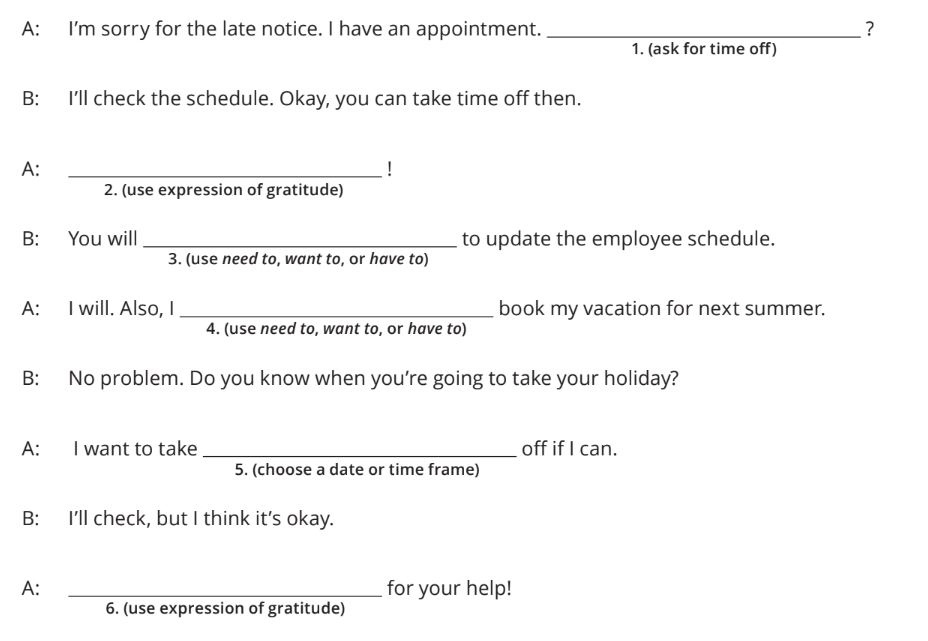Asking for Time Off
In this lesson, you will learn how to ask for time off, report being late, or make a request to leave early from work. You will learn how to use the following expressions: have to, need to, want to, and be able to.
You will also learn how to use the following modals:
• can
• could
• will
• be going to

Part 1
Warm-Up
What are some reasons why you might be late, leave early, or be absent from work or school?
Write your answers below.
_______________________________________________________________
_______________________________________________________________
_______________________________________________________________
_______________________________________________________________
_______________________________________________________________
Part 2
Dialogues
Read the dialogues, and practice with your teacher.
A: I’m sorry for the late notice, but could I take tomorrow off?
B: Can I ask why?
A: I have to see my dentist. She needs to pull a tooth.
B: Oh, that’s too bad! Yes, you can take tomorrow off.
Read the dialogues, and practice with your teacher.
A: Am I able to take next Friday off, please? I want to join my son’s class trip to the zoo.
B: I’m sorry, but no one can cover your shift.
A: I talked to Joanna this morning. She’s going to cover for me.
B: Okay, great. You’ll have to use one of your vacation days for it, though.
A: I understand. Thank you. Is there anything else I need to do?
B: Yes. You need to update the employee schedule. Have fun next Friday!
Read the dialogues, and practice with your teacher.
A: Hi, Wen. Can I come in a little late this morning?
B: Oh, are you okay?
A: I’m fine, but I need to take my mom to her doctor’s appointment. I’ll be about an hour late.
B: No problem. Will you be able to work an hour later tonight?
A: Of course. Thank you for understanding.
Part 3
Useful Expressions
Listen to the conversation between Kirsten and Daniel.
Answer the following questions.
Patterns
To make a request, you can use one of the following patterns:
Can / Could + subject + base verb
Be + subject + able to + base verb
To give a reason, you can use one of the following patterns:
Subject + have to / need to / want to + base verb
Request
• Can I leave early today?
• Could I have tomorrow off?
• Could I come in a little late tomorrow?
• Am I able to take my vacation next month?
Reason
• I have to go to the dentist.
• I need to pick my son up
from school.
• I want to visit my sister
in Montreal.
• I have to take a personal day.* (A “personal day” can mean different things in different workplaces. A personal day usually means you have to take care of yourself or a family member.)
• I have to go to the hospital.
• I want to take two weeks off
for my vacation in June.
• I need to drive my father to
his appointment.
To talk about something that will happen in the future, use:
To talk about something that will happen in the future, use:
Be going to + base verb*
Use this form for actions that are likely to happen or are already planned.
• Look at the traffic! I’m going to be late for work.
• I’m going to take my holidays in July.
• That noise is so loud! I’m going to get a headache.
Will + base verb**
Use this form when you are deciding future plans at the moment.
• I will ask my supervisor.
• I will update my schedule.
• I will check my schedule.
*Pronunciation Note:
“Going to” can sound like “gonna.” You hear this in speaking, but we don’t usually write “gonna.”
• I’m gonna be late for work. (speaking)
• I’m going to be late for work. (writing)
**Grammar Note:
“Will” is often used with a contraction.
• I will call later.
• I’ll call later.
Polite expressions are an important part of any request. “Please,” “thank you,” and “thanks” are all very common.
Use “please” to sound more polite. You can use it at the beginning, in the middle, or at the end of a sentence. “Please” comes before the verb at the beginning or in the middle of a sentence.
Use “thank you” or “thanks” to show gratitude. You can use it at the end of a sentence or conversation. Use it alone or with “for” and a noun or a gerund (-ing).
Please
• Please come to my office before you leave.
• Could I please take tomorrow off?
• I want to take a vacation day next Friday, please.
Thanks / Thank you
• Thanks.
• Thank you.
• Thanks for covering my shift.*
• Thank you for your request. I’ll consider it and get back to you.
*Note:
To “cover a shift” means to do someone’s work for them.
• Maria covered Issa’s shift last week when Issa had a doctor’s appointment.
Part 4
Listening Practice
Listen to these workplace requests.
Is the worker going to arrive late, leave early, or be absent all day?
1. a) arrive late
b) leave early
4. a) leave early
b) be absent
7. a) arrive late
b) leave early
2. a) arrive late
b) leave early
5. a) arrive late
b) be absent
8. a) arrive late
b) be absent
3. a) leave early
b) be absent
6. a) arrive late
b) be absent
9. a) leave early
b) be absent
Listen to the dialogues from Part A again.
Circle the reason for the lateness, absence, or request to leave early.
1. a) sick child
b) weather
c) traffic
4. a) toothache
b) headache
c) backache
7. a) dentist
b) doctor
c) mechanic
2. a) vacation
b) sick child
c) doctor
5. a) doctor
b) mechanic
c) dentist
8. a) doctor
b) dentist
c) mechanic
3. a) vacation
b) personal day
c) illness
6. a) traffic
b) weather
c) health
9. a) personal day
b) illness
c) vacation
Part 5
Speaking Practice
Complete the dialogue using the prompts, and practice with a partner.

Read the dialogue, and practice with a partner. Then change the information in bold to another situation. Switch roles and try again.
DIALOGUE 1
A: Can I come in late tomorrow afternoon?
B: Why?
A: I have to pick my son up from school.
B: Oh, okay. You can come in late.
DIALOGUE 2
A: Can I come in late tomorrow morning?
B: That’s a very busy time. I’m sorry.
A: What about Friday morning?
B: That’s better!
Part 5
Review
Listening to the dialogue between an employee and a supervisor. Answer the questions.
When will the employee need time off?
What is the reason for the time off?
What is the employee going to do tomorrow?
What is the supervisor going to do?
Work with a partner. Imagine one of you is the employee and one of you is the supervisor. The employee will ask for time off. The employee needs to explain the reason for the request and say the exact date or time that is needed. Remember to be polite! The supervisor can accept the request or suggest another day or time.
Here are some examples of reasons for requests for time off:
• an appointment
• an illness
• a family member’s health problem
• the weather or traffic
• a vacation
• car trouble
